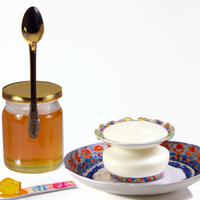
1 serving (150 grams) contains 150 calories, 5.0 grams of protein, 3.0 grams of fat, and 25.0 grams of carbohydrates.

Log this food in SnapCalorie

Nutrition Information
Calories |
236.6 | ||
|---|---|---|---|
% Daily Value* |
|||
| Total Fat | 4.7 g | 6% | |
| Saturated Fat | 3.2 g | 16% | |
| Polyunsaturated Fat | 0 g | ||
| Cholesterol | 15.8 mg | 5% | |
| Sodium | 78.9 mg | 3% | |
| Total Carbohydrates | 39.4 g | 14% | |
| Dietary Fiber | 0 g | 0% | |
| Sugars | 31.5 g | ||
| protein | 7.9 g | 15% | |
| Vitamin D | 78.9 mcg | 394% | |
| Calcium | 236.6 mg | 18% | |
| Iron | 0.2 mg | 1% | |
| Potassium | 315.5 mg | 6% | |
* Percent Daily Values are based on a 2,000 calorie diet. Your daily values may be higher or lower depending on your calorie needs.
Food Attributes
Source of Calories
About Yogurt and honey
Yogurt and honey is a classic combination celebrated in many cuisines, particularly Mediterranean and Middle Eastern traditions. Yogurt, typically made from fermented milk, is rich in protein, calcium, and probiotics that support gut health and digestion. Honey, a natural sweetener produced by bees, contains antioxidants and antimicrobial properties. Together, they create a creamy, naturally sweet dish that is both satisfying and nutritious. This duo can be enjoyed on its own, drizzled over fruits, or used as a topping for granola and desserts. While yogurt with minimal added sugars provides a healthy base, the choice of honey matters, as excessive consumption can increase calorie intake without offering significant nutritional benefits. Opting for raw or minimally processed honey enhances the nutrient profile, making this pairing a wholesome option when consumed in moderation.



